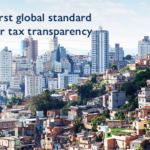Corporate decisions have an ever greater effect upon society and the environment on a global level. As providers of information, we are aware that investors, consumers, employees and other stakeholders increasingly demand an assessment of the performance of companies in these areas to better inform their economic decisions and to exert positive influence upon corporate behaviour.
There are differing experiences regaring disclosure on different issues, which also vary by country. But in general the availability of useful quality information is far below what is needed.
No single strategy provides a universal solution to this problem. For society and company stakeholders to get the best out of the reporting of companies in the 21st Century a mix of regulatory, voluntary and market approaches is required.
The Global Partners for Corporate Responsibility Research present the 10 following demands to governments, companies and all other participants in the global economy.
General demands
1) Stakeholders require quality data that is valid, reliable, free of bias, accessible, comparable, comprehensive, verified, understandable and useable by all interested groups and which is both current and regularly up-dated.
2) International standards for environmental, social or sustainability audits and other initiatives to maintain or improve corporate social or environmental performance must include the publication of comprehensive data according to the demands and needs of stakeholder groups.
3) International harmonisation of reporting practices is vital for stakeholders to gain access to comparable and comprehensive data on all companies
Demands directed at governmental and regulatory bodies
4) Core social and environmental information should be the subject of mandatory disclosure including a requirement upon all companies to report upon the extent to which they monitor their impacts upon stakeholders and the environment, and what management systems (if any) they have in these areas.
5) The information collected by authorities as part of their regulatory activities should be disclosed to stakeholder groups as part of the right to know.
6) Clear and limited definitions of any commercial confidentiality, exclusions to right to know legislation and the right to appeal to an independent body are urgently needed to avoid unnecessary limitations to the availability of social and environmental information.
7) Governments and regulators should encourage and facilitate the use of environmental and social information by stakeholders.
Demands directed at companies and other market participants
8) All companies should report upon their social and environmental performance in a manner which meets the demands of their stakeholders, even where this is not required by law.
9) Independent verification of reported data and the involvement of stakeholders in the reporting process should be seen as essential and in the interest of companies as well as stakeholders because it increases the credibility of the information
10) Companies and those selling or advising upon products or services should facilitate choices and engagement with companies by consumers, investors and other stakeholders on the basis of social and environmental information.
See the downloadable document for further notes on these demands.



